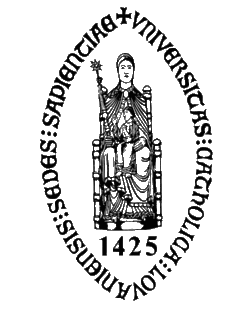Related Research Articles

Leuven or Louvain is the capital and largest city of the province of Flemish Brabant in the Flemish Region of Belgium. It is located about 25 kilometres east of Brussels. The municipality itself comprises the historic city and the former neighbouring municipalities of Heverlee, Kessel-Lo, a part of Korbeek-Lo, Wilsele and Wijgmaal. It is the eighth largest city in Belgium and the fourth in Flanders with more than 100,244 inhabitants.
The Katholieke Universiteit Leuven associatie Kortrijk, or short Kulak is a university satellite campus of the KU Leuven in the city of Kortrijk (Courtrai) in the Belgian province of West-Flanders and therefore also is officially a Dutch-speaking institution.
Jeffrey F. Hamburger is an American art historian specializing in medieval religious art and illuminated manuscripts. In 2000 he joined the faculty of Harvard University, where in 2008 he was appointed the Kuno Francke Professor of German Art and Culture. Hamburger received his B.A., M.A and Ph.D from Yale and has previously held professorships at Oberlin College and the University of Toronto. Elected a Fellow of the Medieval Academy in 2001, he has won numerous awards for his publications, among them: the Charles Rufus Morey Prize of the College Art Association (1999), the Roland H. Bainton Book Prize in Art & Music (1999), the Otto Gründler Prize of the International Congress on Medieval Studies (1999), the Jacques Barzun Prize in Cultural History of the American Philosophical Society (1998), the John Nicholas Brown Prize of the Medieval Academy of America (1994), and the Gustave O. Arlt Award in the Humanities of the American Council of Graduate Schools (1991). His research has been supported by fellowships from the Guggenheim Foundation, the American Philosophical Society, the Institute for Advanced Study, the National Endowment for the Humanities and the Alexander von Humboldt Foundation. In 2009 Hamburger was elected a member of the American Academy of Arts and Sciences and in 2010, of the American Philosophical Society. In 2015 he was awarded an Anneliese Maier Research Award by the Alexander von Humboldt Foundation.
Gerard of Florennes, bishop of Cambrai as Gerard I, had formerly been chaplain to Henry II, Holy Roman Emperor, and helpful to the latter in his political negotiations with Robert the Pious, King of France. In 1024 Gerard called a synod in Arras to confront a purported heresy fomented by the Gundulfian heretics, who denied the efficacy of the Eucharist. The records of this synod, the Acta Synodi Atrebatensis, preserve a summary of orthodox Christian doctrine of the early eleventh century, as well contemporary peace-making practices. According to this text's author, the heretics were convinced by Gerard's explanation of orthodoxy, renounced their heresy, and were reconciled with the church.

The Leuven Faculty of Theology was a branch of the Catholic University of Leuven, established following the Belgian Revolution of 1830, on the initiative of the Belgian bishops. The faculty traces its history back to the Faculty of Theology founded in 1432, with a hiatus between 1797 and 1834 due to the French Revolution. In 1968 the faculty was divided into Flemish and French speaking departments, and they exist today as faculties of two separate universities : the Faculty of Theology and Religious Studies of the Katholieke Universiteit Leuven, and the Faculty of Theology of the University of Louvain (UCLouvain), which moved to Louvain-la-Neuve.

The State University of Leuven was a university founded in 1817 in Leuven in Belgium, then part of the United Kingdom of the Netherlands. It was distinct from the Old University of Leuven (1425-1797) and from the Catholic University of Leuven, which moved to Leuven after the State University had been closed in 1835.

The Old University of Leuven is the name historians give to the university, or studium generale, founded in Leuven, Brabant, in 1425. The university was closed in 1797, a week after the cession to the French Republic of the Austrian Netherlands and the principality of Liège by the Treaty of Campo Formio.
Edward Lipiński, or Edouard Lipiński, is a Belgian Biblical scholar and Orientalist.

The Katholieke Universiteit Leuven, abbreviated KU Leuven, is a research university in the Dutch-speaking town of Leuven in Flanders, Belgium, founded in 1834 in Mechelen as the Catholic University of Belgium and moved its seat to the town of Leuven in 1835 where it changed its name to Catholic University of Leuven. KU Leuven considers itself to be the continuation of the Studium Generale Lovaniense established in 1425 and suppressed in 1797 under French rule.
Michel Ostyn was a Belgian physiologist, sports physician and sports medicine pioneer.
Gaston Vandendriessche was a Belgian psychologist, best known for his extensive study on the so-called Haizmann case, first analyzed by Sigmund Freud in 1923.
The Perpetual Edict of 12 July 1611 was a decree of the Archdukes Albert and Isabella governing legal process in the Southern Netherlands. It consisted of 47 clauses laying out the basic rules of criminal and civil procedure. It was printed in both Dutch and French by Rutger Velpius, printer to the court. The edict had a fundamental impact on the codification of customary law, which it did much to encourage. It also placed a legal obligation on parish churches to register births, marriages and deaths, and on local magistrates to ensure that the secular authorities obtained a copy of such registers each year.

This is a timeline of Belgian history, including important legal and territorial changes and political events in Belgium and its predecessor states. To read about the background to these events, see History of Belgium. See also the list of Belgian monarchs.
Jan Roegiers (1944–2013) was a professor at the Katholieke Universiteit Leuven, and also university archivist, librarian and curator. He specialised in early modern academic history, and in particular the history of the pre-1797 University of Leuven. During his lifetime he was "generally regarded as one of the most authoritative voices in the world of academic history, archive and library science and the heritage sector in Belgium." He is also credited with giving the newly established Flemish university a sense of historical continuity with Leuven's past.
Randall Christoph Herman Lesaffer is a Belgian historian of international law. He has been professor of legal history at Tilburg University since 1999, where he also served as dean of Tilburg Law School from 2008 to 2012. His work focuses on the Early Modern Age.
Barbara Baert is a Belgian art historian, and professor of art history at KU Leuven.

Marc Dessauvage (1931–1984) was a Belgian ecclesiastical architect, active primarily in the 1960s and 1970s. He broke with traditional church architecture to produce modernist buildings that were thought to give expression to the liturgical reforms of the time. In 1959 he won a Pro Arte Christiana design competition, drawing further praise from the Jesuit art theorist Geert Bekaert and the Benedictine liturgist Frédéric Debuyst, which launched him on a 20-year career. His growing deafness made communication with clients problematic. One of his most prestigious designs was for the Faculty of Arts of the Katholieke Universiteit Leuven (1971–72).
Marie-Elisabeth Belpaire was a Belgian writer and activist. She was known as the "mother of the Flemish Movement".
Henri-Joseph de Lannoy was a Flemish luthier and a crafter of string instruments such as violins, violas and cellos. His instruments are recognized as key examples of 18th century violin making in Flanders, characterized by their fine work and golden-yellow varnish.
References
- 1 2 "Brigitte Leonie Isabelle Meijns". Institute for Advanced Study.
- ↑ "Studiedag over monnikenleven". Het Laatste Nieuws . 15 Oct 2015.
- ↑ Review by Walter Simons in Speculum , 78:3 (2003), pp. 962-963.
- ↑ B. Meijns, "The Canonical Order in the County of Flanders from the Merovingian Period until 1155", Revue d'Histoire Ecclesiastique , 97:1 (2002), pp. 1-57.
- ↑ De canonicis qui seculares dicuntur: treize siècles de chapitres séculiers dans les anciens Pays-Bas, edited by B. Meijns and M. Carnier (Turnhout, 2018)
- ↑ B. Meijns, "Les chanoines séculiers : histoire et fonctions dans la société (IXe‐XIIe siècle)", in Les chapitres séculiers et leur culture: Vie canoniale, art et musique à Saint-Yrieix (VIe-XIIIe siècle), edited by Claude Andrault-Schmitt and Philippe Depreux (Limoges, 2014), pp. 15-30.
- ↑ B. Meijns, "Canon communities dependent on the Benedictine Abbeys during the upper middle ages. Example of the County of Flanders", Revue Bénédictine , 113:2 (2013), pp. 90-123.
- ↑ B. Meijns, "Opposition to Clerical Continence and the Gregorian Celibacy Legislation in the Diocese of Thérouanne: Tractatus pro Clericorum Conubio (c. 1077-1078)", Sacris Erudiri. A Journal on the Inheritance of Early and Medieval Christianity, 47 (2008), pp. 223-290.
- ↑ B. Meijns, "Papal Bulls as Instruments of Reform: the Reception of the Protection Bulls of Gregory VII in the Dioceses of Liège and Thérouanne (1074-1077)", Church History , 87:2 (2018), pp. 399-423.
- ↑ B. Meijns, "The Policy on Relic-Translations of Baldwin II of Flanders (879-†918), Edward of Wessex (899-†924) and Æthelflaed of Mercia (†924): A Key to Anglo-Flemish Relations?", in England and the Continent in the Tenth Century: Studies in honour of Wilhelm Levison (1876-1947), edited by D. Rollason, C. Leyser and H. Williams (Turnhout, 2011), pp. 473-492.
- ↑ B. Meijns, "England and Flanders around 1066: The Cult of the English Saints Oswald and Lewinna in the Comital Abbey of Bergues", Anglo-Norman Studies XXXIX: Proceedings of the Battle conference 2016, edited by E. van Houts (Woodbridge, 2017), pp. 128-149.
- 1 2 "Brigitte Meijns". Katholieke Universiteit Leuven.